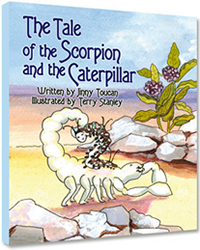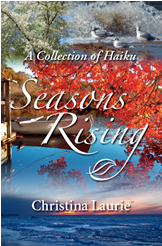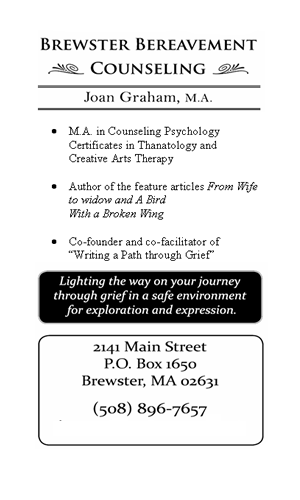

Creating Beauty from Grief "The Tale of the Scorpion and the Caterpillar"
by Katie O'Sullivan
Losing a child is every mother's nightmare. Jinny Toucan lived through the nightmare when one of her two adult sons passed away at the age of 23, just after graduating from Rice University.
"The grief of losing my son Tarik was overwhelming," says Jinny. "Writing was a form of deep healing for me. I wanted to reach out to those who lost a loved one."
Tarik's passing started Jinny on a path of spiritual exploration, bringing her back to the days of her boys' childhoods, and the stories she would both read from books and weave from her imagination. "Children have a way of seeing things in the most simplistic way," she explains.
Writing Through Grief: Telling Stories to Cope with the Loss of a Loved One
by Jackie Powers
When someone loses a loved one, he or she experiences a range of emotions. Grief is often one of the most prominent feelings, and the grieving process is never easy.
To help those who have lost a loved one, Beacon Hospice in Hyannis has developed a support group entitled Mending Our Hearts, Writing Through Grief.
Writing is an accessible art form that can empower everyone. It is free and can be done anywhere, anytime, alone, or with others. One does not have to know how to spell to write.
The goal of Beacon Hospice's support group is to create a safe and supportive environment in which to write one's stories, feelings and memories. Members gain confidence in this healing tool and integrate it into their grief work.
Writing connects members with themselves. Through the writing process, they can access their innermost thoughts, fears, hopes and dreams.
For more information about
Mending Our Hearts, Writing Through Grief:
(508) 778 1622 www.beaconhospice.com
(listed under
bereavement, Hyannis)

What is Haiku?
A Seasoned Poet Explains
by Christina Laurie
Three lines, 17 syllables.
It doesn't sound like much to work with when writing a verse. Writing haiku poses a challenge to the seasoned poet as much as a beginning fourth grader. You must say all you want in a small space.
When one is accustomed to reading western poetry, one may find haiku a shock; it seems to end before it has really begun. But the joy of the piece is that the mind carries the theme into the reader's experience. You don't need to say it all.
Inferences in haiku force the reader to finish the poem. It's called the "ah-ha" moment in haiku, that leads to the completion of the idea in the reader's mind.
by Christina Laurie

or call 508 540 0762
Sister Crab
(for Lynn)
by Rosanne Shapiro
"When you have come to the edge of all the light you know and are about to step out into the darkness of the unknown, Faith is knowing that one of two things will happen: There will be something solid to stand on . . . or you will be taught to fly."
– Anonymous
I. Such sensitive creatures, you and I, skittering sideways or nipping with our claws and then skittering away.
We learned these maneuvers early on – nature's way to keep us safe – never knowing if we face the enemy or another scared creature.
We tell ourselves stories about a world viewed through tiny crab eyes, felt with antennae alert to potential dangers. We believe our tender souls need protection.
II. One day a wise crab asks: "Am I truly alive or just a shadow? Am I scared safe?"
She moves forward slowly, to where the earth drops off, where she has to go, knowing only this:...

